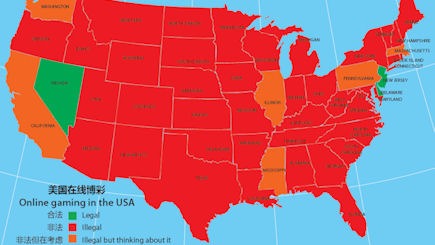This article first appeared in the Jul/Aug 2015 issue of WGM.
Since being appointed President and CEO of the American Gaming Association in April 2013, Geoff Freeman has carried on the organization’s proud legacy of representing and standing behind the country’s US$240 billion casino industry. He has also been heavily involved with G2E alongside co-organizers Reed Exhibitions and it was during this year’s G2E Asia that he sat down with WGM CEO Andrew W Scott to discuss his observations of both the US and Macau gaming industries.
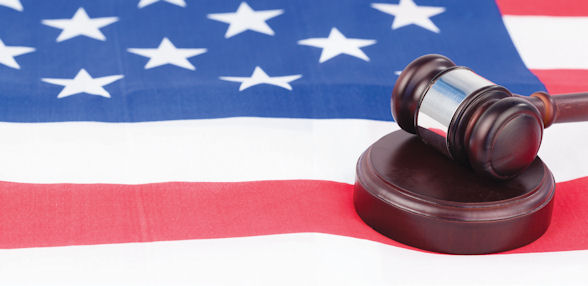
Andrew W Scott: Thanks for speaking with us Geoff. Can you start by running our readers through exactly what the American Gaming Association (AGA) does?
Geoff Freeman: The AGA represents all aspects of the US casino gaming industry. We represent operators – including the three here in Macau in MGM, Las Vegas Sands and Wynn – as well as all the other operators in the United States and the supplier community such as IGT and Scientific Games. Over the past year we’ve welcomed tribal gaming interests into our organization as well – the reason being that if we claim to represent the gaming industry we need to represent the gaming industry. In the United States there is a bit of history between tribal gaming and commercial gaming – different rules that they play by – but I’m of the opinion that we’ve got more in common than we do at odds so let’s focus on the common and address those issues. We are taking a very proactive approach to the AGA, a very progressive, transparent and inclusive approach. We are seeking to be the greatest champion this industry has ever seen. I think the industry has a great story to tell. I think the industry makes great contributions at a local level, at a state level and at a federal level and we need to tell that story. The industry is probably a bit guilty of feeling guilty about this product we provide yet this product is enjoyed by millions of people, it’s enjoyed in a responsible way in almost every instance and we need to champion that.
AWS: The AGA has been involved with organizing G2E Asia for nine years now. What have you learnt about gaming in Asia and particularly Macau in that time?
GF: I think the primary difference is that in the United States you have over 1,000 casinos. Here you have six operators in Macau, two in Singapore, a handful in Korea and a handful in other places. It’s a different approach. It’s a different approach to how the industry is experienced and how the product is provided. There has long been a focus in the Asian market on the VIP customer and that makes sense. Why rob a bank? Because that’s where the money is. Why focus on the VIP customer? Because that’s where the money is. At the same time, as we’ve seen in the US, you have to diversify your customer base and your product. Now the hard part for Macau is that the mass market customer is harder to attract. They’re more disparate and it really tests your market prowess, it tests your product offering and that’s what we’re going to see in Macau most likely in the future. It’s certainly what we’ve seen in the United States. But that’s what brings out the best in the industry. Each one of these companies has different strategies as to how they will succeed and you’re going to see them test that. You’re going to see them pushed here in the Macau market in the months and years ahead and I think for Macau’s long term interests that’s a good thing.

AWS: What are your thoughts on the current climate in Macau?
GF: I think when times are good people get over-confident and when times are challenging people often press the panic button too quickly. I was here a year ago and no one was predicting where we are today, so I think it would be foolish to try and predict where we will be a year from now. This is an industry that is constantly facing change, it is constantly under pressure. It has experience with that. And I’m pleasantly surprised – the companies I speak with, I don’t hear a lot of panic in their voices. It’s going to be tough and it’s going to force them to do things a bit differently but they relish that challenge. I think for the diversification of the Macau market and achieving what some of the Macanese and Chinese authorities want to achieve in making this a very broad entertainment offering, that’s what these changes are going to help to do.
AWS: Should Macau be looking to Las Vegas as a model of how to diversify its offerings?
GF: Non-gaming in Las Vegas is about two-thirds of revenue at this point and it has become bigger and more critical to those companies than probably any of them imagined. Just as it would have been premature to write the story of Las Vegas 20 years ago, it’s premature to write the story of Macau now. Las Vegas wouldn’t have predicted the amount of money they can develop through retail, lodgings, restaurants, clubs – it’s been a great boom for the market and has forced them to think differently.
In Macau, when the government says they want to aspire to achieve something I take them at face value. Most of the industry does too, so the industry will help to develop that. It’s worth noting that even though non-gaming is two-thirds of the revenue in Las Vegas, non-gaming on a volume level is higher here in Macau. That shows there is demand here. The challenge is that these things have to be symbiotic. The customer and the industry have to get there at the same time.
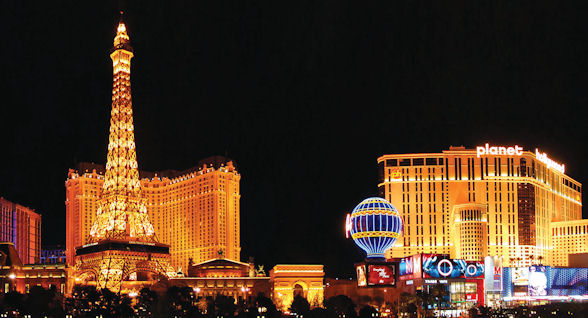
Las Vegas has overcome geographical hurdles with a well-planned marketing strategy
If the customer is ahead of the industry they’re going to look around, say “There’s not enough here” and never come back. Conversely, if the industry is ahead of the customer and building all of this non-gaming that isn’t being consumed it’s going to be extremely costly, dissuade people from making further investments and won’t be in anyone’s best interests. The Macau customer has seen it through one lens, there needs to be a symbiotic change to get them to see it through a different lens. Vegas has done that. One of the most interesting things about Las Vegas to date, you look at what the Las Vegas Convention and Visitors Authority does – they spend a couple of hundred million dollars a year marketing that destination and they’ve never once marketed gambling. Ever.
So it makes you wonder, what is the marketing strategy for Macau? How are they introducing themselves to the region and to the world to tell the story they want to tell? That’s an investment that needs to be made. Macau has been easy. People just come. I look at Las Vegas and the amount of time and energy they invest not only in marketing but also in access – working with long-haul carriers to get them to fly into Las Vegas. Well, how much of that is happening in Macau? The experience getting in from Hong Kong is not as easy as the experience of landing at McCarren and going straight to The Strip. Those are some of the areas where Macau will be tested now.
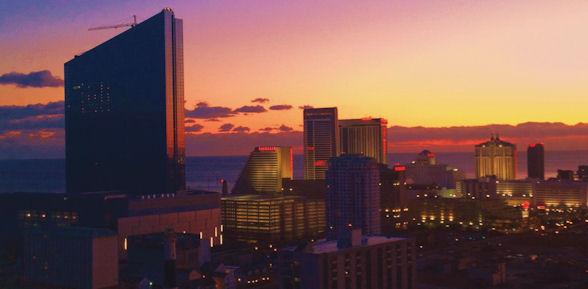
Atlantic City is in serious decline with a third of its casinos now closed
AWS: Speaking of Las Vegas, there have been some positive signs in regards to gaming revenue recently yet Atlantic City remains in serious decline …
GF: And with good reason. Atlantic City is a great example and should be a wake-up call to anyone who thinks that gaming is easy. In a sense, albeit on a different scale, a question that Macau can be asking itself is, “Las Vegas model or Atlantic City model?” The Atlantic City model was “Build it and they will come.” They thought it was easy. You know, “forget the fact that it’s a pain to get here, forget the fact that competition is emerging all around us, forget the fact that our regulatory policy is really tying one hand behind the industry’s back.” That was the Atlantic City approach. The Las Vegas approach was “We’re in the middle of a desert! We’ve got to make this thing work. We’ve got to fight to get the customer. We’ve got to fight to provide a compelling product” – and they did that. Travellers, customers, want to follow the path of least resistance and when you look at that you can instantly see why Las Vegas is a more compelling product than Atlantic City and what led to Atlantic City’s standing today.
AWS: Let’s discuss online gaming. Some US states such as Nevada, New Jersey and Delaware have made online gaming legal over the past few years, other states are actively discussing it and some remain vehemently opposed. What is the AGA’s position on online gaming?
GF: I think for a variety of reasons online gaming has been slow to take hold in Nevada, New Jersey and Delaware. Some of that has to do with payment processing although there are other reasons for it. It hasn’t captured the interest like some imagined. I certainly can’t predict whether that will change in the coming months. You know, will Pennsylvania go online, will California go online – that’s to be determined. The other issue is will we see a federal ban on online gaming? That’s a very real possibility and it’s one that we follow quite closely.
It’s also an issue whereby the members of our association have distinct and disparate points of view on that topic. A couple of companies would like to see it banned in large part because they see it as a threat to their brick and mortar properties, others would like to have that online channel available to them. All I can tell you is that we are in constant discussions with our members as to the issue, our position on the issue and how things are evolving. It’s very much an open-ended issue in the States at the moment.
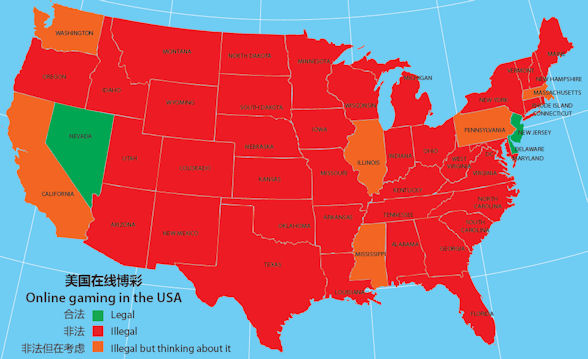
AWS: One man who has been extremely vocal in his opposition to online gaming is Sheldon Adelson. What are your thoughts on his views?
GF: I think that Sheldon is very sincere in his concerns about easy access leading to greater addiction and his concerns about cannibalization. I think he is very sincere about those things and I wouldn’t question his sincerity any more than I would question a champion of online gaming. It would be ideal if we as an industry could have a collective point of view because one way or another our products will always have to evolve, we know that, and the online channels aren’t going to be eliminated so we’re going to have to figure out how we interact with that.
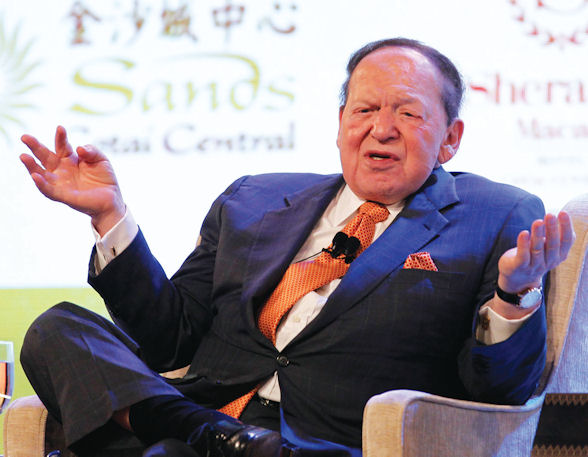
Las Vegas Sands Chairman and CEO of Sands China Limited Sheldon Adelson has been a vocal opponent of online gaming in the United States
AWS: Is there reason to be suspicious of Sheldon’s motives though? For him to claim he is concerned about gambling addiction while also being concerned about cannibalization seems a little contradictory.
GF: I’ve had the opportunity to speak with him directly about it and I know he believes in both of those issues. Those are his concerns and again I believe he is sincere about that. With that said, it’s a living and breathing issue, opinions of people in the industry are constantly evolving and even what we see as online gaming today might be different to what we see as online gaming in five years’ time. You know, what role would sports betting have? It’s not a traditional casino-style product but is certainly an issue where mobile betting could play a role and the industry could benefit.
AWS: On a personal note, you were appointed President and CEO of the AGA in early 2013 but of course had very big shoes to fill following on from Frank Fahrenkopf who held the position for 18 years. How have you found the transition?
GF: It’s great. As Frank left, we took his shoes and we put them in a frame on the wall and we look at Frank’s big shoes all the time! (laughs) No, Frank has been a tremendous mentor and a very good friend. I rely on his counsel frequently. The good thing for me is that I haven’t tried to repeat what Frank has done. The industry is in a different place today than it was when the AGA was created and we’re taking a different path. That’s why we’ve opened up to tribal organizations. We’re very proactive on various issues so I think taking a new and different path while also leaning on Frank when the time has been right has been very helpful.
AWS: One issue the AGA itself has been very vocal on is illegal gambling. How big an issue is illegal gambling in the United States and beyond?
GF: It’s a very, very serious issue and what motivates us to take a stand against it is the fact that illegal gambling threatens both the business potential and the image of our industry. It’s interesting that we’re here in Macau talking about it because nowhere does illegal gambling run more rampant than in Asia where you have illegal gambling at every turn. It’s a threat to the casino product because it harms the image of this industry, plus it prevents people from understanding the differences with regulated gaming and the benefits we deliver both through taxes and partnerships with local communities. So we’re very passionate about this issue and are looking for opportunities to work with law enforcement to help squash it. We’re not naïve – we’re not going to eliminate all things illegal – and we also think there are some things that are illegal that shouldn’t be illegal. The idea that filling out your March Madness bracket [Ed: a type of sports betting whereby players compete to correctly predict the results of the annual NCAA Basketball Championship] is illegal is failing to keep up with the times. We want to contribute in a very positive way here and we also want to distinguish the businesses that we operate from those that don’t make the same commitments to the customer or the regulators.
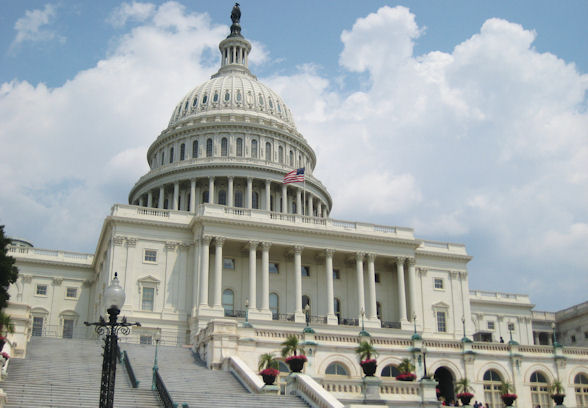
The home of the US Congress at Capitol Hill, Washington DC
AWS: What are the main areas of concern when it comes to illegal gambling in the USA?
GF: There are four primary areas. One is the black market machines. We’ve got thousands of machines across the state of Texas, for example. Here is a state that says they are uncomfortable with casino gaming yet they’ve got gaming in its worst form across the state. That’s a concern. Two would be the internet sweepstakes cafés – these places that pop up and pretend to be non-gambling but are gambling. It is convenience gambling that undercuts our business and does so by swerving the rules. Third would be illegal sports betting – people working with their bookies all over the US with tens if not hundreds of billions of dollars going into that. And fourthly would be illegal online operators – mostly offshore – who again don’t make the same commitments to customers. There are no guarantees you’re going to get your money back, therefore violating the rules that are in place in the United States. Those are the primary areas of concern for us.

